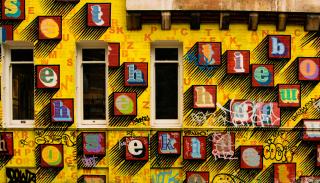
Breadcrumbs navigation
A-Z of IR: O is for 'Order' and P is for 'Power'
Inspired by the British Academy’s focus on Engaging the Public with Humanities and the Social Sciences (2023), in October 2024, Adrian Gallagher (Leeds) launched an A-Z in International Politics online and free of charge. This 26 part series over 26 weeks introduces key concepts such as A is for Anarchy, B for Balance of Power, C for Cooperation and so forth. They are released on Instagram (Prof_Politics), TikTok (Professor_Politics), LinkedIn, and YouTube (@ProfessorGallagher).
In the first few months alone, Instagram generated more than 38,000 views, 2000 interactions and 1200 followers, TikTok 22,243 views, YouTube over 1000 views, and LinkedIn around 10,000 views.
This week we look at the letters 'O' and 'P'.
O is for 'Order'.
It is often stated that the Liberal International Order is in 'crisis'. But what is the Liberal International Order?
John Ikenberry argues that the LIO has two strands; the nation state system dating to the Treaty of Westphalia in 1648, and the acendency of liberalism that came under British and US hegemony. This culminated after World War II with the creation of the UN and the Bretton Woods institutions - embedding liberalism in the international system, as we saw values such as state sovereignty and commitment to free trade as a social purpose.
Over 70 years later, the 2007-2008 financial crisis combined with the rise of BRICS countries (Brazil, Russia, India, China and South Africa), sees a era of shifting power balances challenging the system. The first threat is liberal states themselves. Donald Trump has attacked the UN and NATO alliance, and argued that the liberal order does not serve US interests. This is part of a broader trend of liberal states turning inward. The second threat comes from revisionist states, with Russia and China at the vanguard. They have benefitted from the international order, having permanent seats on the UN Security Council, but argue that the Liberal Order benefits Western states more than theirs and requires revision. The third challenge comes from the periphery, with states in the Global South arguing that the Liberal Order was imposed on them. Postcolonial scholars explain how Global South states have become increasingly resistant to liberal states that speak of universal human rights and prosperity, but fail to reflect on structures that maintain global inequalities. They see the Liberal Order as a colonial project.
Historically major system reordering comes after major wars. If change is happening, hopefully it can happen with a pen and not a bomb.
P is for 'Power'.
Power is one of the most complex concepts in International Relations. At it's heart it means using all the tool at your disposal to get someone to do what you want them to do.
The first is coercion. This is a very direct form of power. At the international level, we often think about military and economic power and how it is used coercively. In terms of tools in a toolbox, the US has approximately 750 bases in around 80 countries across the world and spent $916 billion on military spending in 2023 alone. This is around three times as much as China and nine times as much as Russia. It can use all of this to try to influence government, or get rid of them entirely. We might think about the 2003 war in Iraq. The US implemented economic sanctions to try to influence the behaviour of the Saddam regime. In the end, they resorted to the use of force. Drawn out war after the invasion of Iraq saw over 180,000 Iraqi civilians killed, and it cost the US $1.922 trillion.
As with Afghanistan and Libya, Iraq reminds us of the strengths and limits of US power. It can easily get rid of governments, but cannot necessarily control what happens after.
The second type of power is inducement. If you do what I want you to do, I will give you something in return. This can be seen in International Monetary Fund (IMF) structural adjustment policies. Following the Greek financial crisis of 2009, the IMF offered a financial rescue package in return for a restructuring of the Greek economy. Widespread resistance in Greece followed, but the Greek government accepted the package.
Thirdly, there is persuasion. This is an appeal to ideas and values to try to influence behaviour. We might think of the United Nations here. The power of the UN lies in its ability to persuade as it has no standing army. The failure to persuade those like Assad and Putin in the last decade has brought the authority of the UN into question. The UN has been at the vanguard of trying to persuade states over climate change. It cannot force governments and corporations to act, but we would be further from progress if the UN didn't intervene. In domestic policy, we can think about how civil society can persuade changes in government behaviour, as was the case with the Trump administration's border policies from 2016-2020.
Photo by Robert Stump on Unsplash


